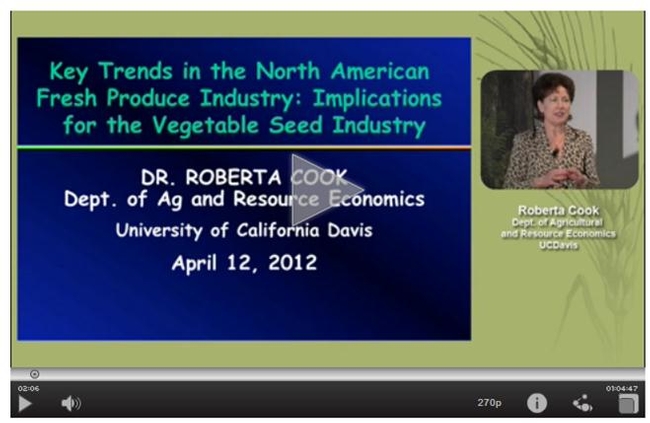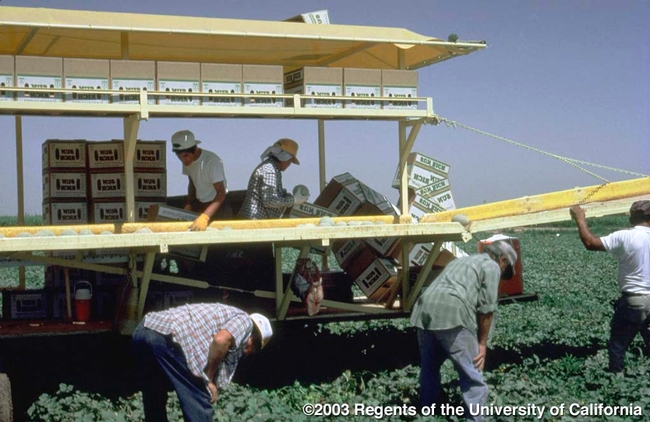Posts Tagged: Trevor Suslow
No need to pass on the Caesar's salad
At least 58 people have been sickened, and two — one in California and one in Canada — have died because they contracted E. coli O157:H7 in November and December, believed to be related to eating romaine lettuce or other leafy greens. In the United States, the U.S. Centers for Disease Control has linked at least 17 reports of illness in 13 states to the outbreak.
That has many people passing on Caesar's salad. But UC Cooperative Extension specialist Trevor Suslow said it is unlikely that romaine now at grocery stores is contaminated, reported Bob Rodriguez in the Fresno Bee.
"It's not going to last that long, it's gone," Suslow said.
The CDC is conducting whole genome sequencing on samples of bacteria making people sick in the U.S. and Canada to determine whether they are related. Preliminary results show the type of E. coli is closely related genetically, the CDC reported.
Food safety technology has improved in leaps and generations
Food safety technology has improved significantly in recent years as molecular microbiology, electronic data sharing and analysis of matching genetic relatedness has advanced, reported Samantha Masunaga in the Los Angeles Times. The comments are from UC Agriculture and Natural Resources Cooperative Extension specialist Trevor Suslow, who is featured in a Q&A about the food safety problems suffered by the fast-casual restaurant chain Chipotle Mexican Grill.
"We've got a long way to go still to make the level of compliance more uniform, better, cheaper, and some of it is simply lack of science and lack of knowledge about the specific link between practices, pathogen biology, exposure," Suslow said.
He believes the food at Chipotle is not necessarily safer now that changes have been made at the popular restaurants.
"I know from personal contact that many similar fast-casual and fast-food restaurants are reassessing their internal operations and their supply chain management," Suslow said. "I guess we'll wait and see how their consumer base responds if they implement the practices of trying to do treatments that change the fresh nature of their components that might not normally be cooked."
Postharvest specialists share their expertise at 'Seed Central'
Aiming to energize the seed industry cluster surrounding UC Davis, Seed Central, an initiative of the Seed Biotechnology Center at UC Davis and SeedQuest, recently highlighted postharvest handling and food safety at their monthly forum. Recordings of invited guest speakers, Marita Cantwell, Trevor Suslow and Roberta Cook, UC Cooperative Extension specialists with expertise in post harvest science, show the passion they feel for their respective subjects and why we're fortunate to have them on our team. Cantwell and Suslow are in the UC Davis Department of Plant Sciences; Cook is in the UC Davis Department of Agricultural and Resource Economics.
Cantwell, a postharvest physiologist, specializes in handling and storage of intact and fresh-cut vegetables. In her talk, she describes the Postharvest Technology Center itself and gives an overview of the handling challenges of many vegetable varieties.
A plant pathologist, Suslow’s program centers on studying the effects of microflora on the postharvest quality of perishable produce. With much attention to current food safety a priority, Suslow’s produce safety overview and specific case examples help us all (ahem) digest this hot topic.
Cook, an agricultural economist, focuses on fresh produce marketing and food distribution. This presentation centers on North American vegetable markets. Even if you’re not a grower, shipper or retailer, Cook's description of trends in the produce industry are fascinating — we all eat fruits and vegetables every day. She talks about things we might not ever think about.
Food safety specialist addresses cantaloupe guidelines
Trevor Suslow, UC Cooperative Extension food safety specialist at Davis, was told by the farm owner that they believed the postharvest system used in conjunction with the outbreak was an improvement over their previous methods — though Suslow disagrees. He acknowledges, however, that the FDA does not make a definitive statement in its growing guidelines on the safest method of cleaning, cooling or packing cantaloupe.
Agricultural program helps keep youth out of gangs
An Associated Press article by Gosia Wozniacka profiles volunteer work by Manuel Jimenez, UC Cooperative Extension farm advisor in Tulare County. The article was published by news outlets such as the Fresno Bee, San Francisco Chronicle, ABC News, Fox News, CBS News, Seattle Post-Intelligencer and others.
He and wife Olga teach life skills and farming techniques to youth on a 14-acre garden in Woodlake, Calif.
"We want to grow kids in our gardens, because we've seen what violence, drugs and alcohol can do," Jimenez told the reporter.
The article also includes comments from youth volunteers in the program, past and present.
"Everything Manuel did was interesting to me," said Walter Martinez, who is now a UC Cooperative Extension field assistant and also served as a volunteer at the garden through middle and high school.
Enjoy summer’s fruits and vegetables — safely
Now that we’re in the thick of summer and eating bountiful quantities of uncooked fresh fruits and vegetables (salads, and fruit bowls, and tomatoes — oh my!), it’s time to make sure we handle them properly to avoid foodborne illnesses.
According to Dr. Trevlor Suslow, a plant pathologist and Cooperative Extension specialist at UC Davis, “Americans consume more than six billion servings of uncooked fresh fruits and vegetables every year, versus a very small number of illnesses that are clearly linked to foodborne pathogens.”
The take-home message is that the food supply in the U.S. is generally very safe, particularly when everyone in the food supply chain (including consumers) does their part to assure food safety.
The U.S. Food and Drug Administration (FDA) recently released the following information for home consumers:
Nearly 48 million people (1 in 6 people) are sickened by food contaminated with harmful germs each year, and some of the causes might surprise you.
Although most people know animal products must be handled carefully to prevent illness, many don’t realize that produce can also be the culprit in foodborne illness. In recent years, the U.S. has had several outbreaks of illness caused by contaminated fruits and vegetables — including spinach, tomatoes, and lettuce.
Fresh produce can become contaminated in many ways. During the growing phase, fruits and veggies may be contaminated by animals, harmful substances in the soil or water, and poor worker hygiene. After produce is harvested, it passes through many hands, increasing the contamination risk. Contamination can even occur after the produce has been purchased, during food preparation, or through inadequate storage.
The FDA says to choose produce that isn’t bruised or damaged, and make sure that pre-cut items — such as bags of lettuce or watermelon slices — are either refrigerated or on ice both in the store and at home. In addition, follow these recommendations:
- Wash your hands for 20 seconds with water and soap before and after preparing fresh produce.
- Cut away any damaged or bruised areas before preparing or eating.
- Gently rub produce while holding under plain running water. There’s no need to use soap or a produce wash.
- Wash produce BEFORE you peel it, so dirt and bacteria aren’t transferred from the knife onto the fruit or vegetable.
- Use a clean vegetable brush to scrub firm produce, such as melons and cucumbers.
- Dry produce with a clean cloth or paper towel to further reduce bacteria that may be present.
- Throw away the outermost leaves of a head of lettuce or cabbage.
Store perishable produce in the refrigerator at 40 degrees or below.
(Condensed from an FDA news release. The site has an interesting video and useful links to other sites with food safety information.)
For more on what UC Davis and UC Cooperative Extension are doing to assure the safety of fresh produce:
- UC Food Safety website
- Postharvest Technology Center website
- Center for Produce Safety website
- UC publications







![Food blog 01 5751417888 59f0a8c3ca m[1] Food blog 01 5751417888 59f0a8c3ca m[1]](http://ucanr.org/blogs/food/blogfiles/7859.jpg)